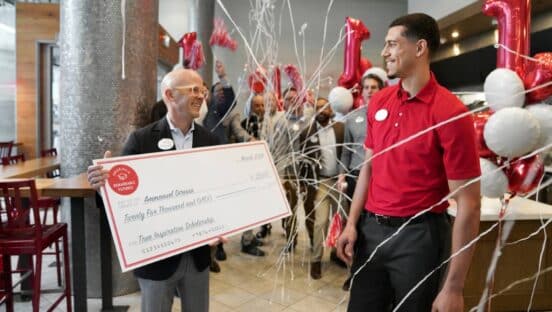Starbucks unveiled a new employee benefit aimed at helping ease child care burdens. In partnership with Care.com, the java chain is now offering Care@Work, an online service that connects families and caregivers. All employees who work at U.S. company-run stores will receive 10 subsidized backup care days a year for kids and adults.
“This is giving our partners resources for things that happen in regular life. We wanted to give them something to help fill in the gaps,” said Ron Crawford, vice president of benefits at Starbucks.
With more than 175,000 employees in the U.S., Starbucks is among the largest retailers in the country to offer the benefit. Starbucks said the package was introduced in response to employee feedback, and a growing issue in the workforce.
A recent analysis of the National Survey of Children’s Health showed that 2 million working parents had to quit their jobs in 2016 because of childcare issues. One in five U.S. workers said they are currently providing assistance for older relatives and friends, according to a report by the AARP Public Policy Institute. And nearly 70 percent of those who do say they had to take time off or make other work adjustments because of caregiving.
Crawford said Care@Work “is the final piece of the puzzle” for Starbucks. Through the program, employees will receive free premium membership to Care.com, which typically costs around $150 a year, and access to Care.com’s digital platform of caregivers.
Employees will pay $1 an hour for in-home backup child or adult care or $5 per day per child for in-center childcare. (After the 10 backup care days, or for other services offered through Care.com such as pet sitting and housekeeping, partners pay the full cost.)
Additionally, employees can access resources to help with senior care planning. They can connect at no cost with a Senior Care Adviser for professional guidance and a customized plan for senior care, from housing alternatives to legal concerns.
“We all have needs at home, whether you have children, pets, parents or aging grandparents. This benefit supports the partner and their family. We are all more than who we are at work,” said Alyssa Brock, director of benefits at Starbucks, in a statement.
Starbucks’ benefits package is industry leading. It is available to eligible employees who work at least 20 hours a week and includes comprehensive and affordable health insurance, a tuition-free college degree program, equity in the form of stock, paid parental leave, and more.
The company provides mental health benefits through its Employee Assistance Program. Unlike many retailers, Starbucks doesn’t have tenure requirements beyond its initial benefits eligibility, which is 90 days, for parental leave.
Some of the details of its parental leave platform include:
- All benefits-eligible birth mothers (store and non-store) working at least 20 hours a week are eligible for six weeks of leave for medical recovery, paid at 100 percent of their average pay.
- All benefits-eligible store partners who welcome a new child by adoption are eligible for our adoption allowance plan which provides pay while a partner is on an approved parental leave. Adoption allowance is paid at 100 percent of their average pay for up to 6 weeks.
- In addition, all benefits-eligible store partner new parents working part-time or more who welcome a new child, by birth, foster or adoption, are eligible to take 6 weeks of paid leave without needing to meet Family Medical Leave (FMLA) eligibility requirements. They also have the ability to take an additional 12 weeks of unpaid leave, if they so choose.
- Further, any benefits-eligible non-store partner new parents—including spouses and domestic partners – who welcome a new child, by birth, foster or by adoption, will be eligible to take 12 weeks of leave paid at 100 percent of average pay—allowing us to remain competitive in our efforts to seek and retain non-store talent.
Earlier this year, Starbucks also announced a Partner and Family Sick Time benefit that allows employees to accrue paid sick time based on hours worked and use it for themselves or a family member in need.













